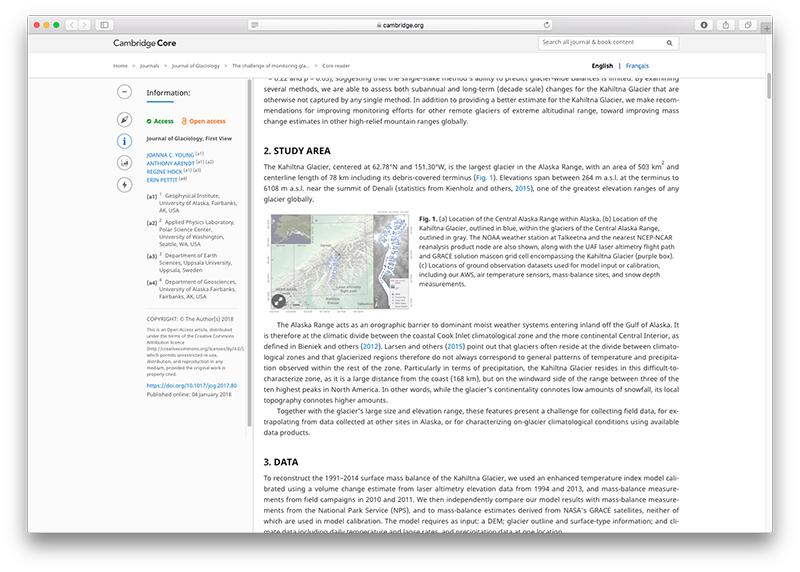Enhancing digital access to Cambridge's academic content
Founded in 1534 by King Henry VIII, Cambridge University Press is the oldest publishing house in the world. Over the past five centuries, countless great thinkers, scientists and other acclaimed authors have turned to the Press for the publication of their works. Among them, you will find the likes of Isaac Newton, Bertrand Russel, Noam Chomsky and Stephen Hawking. Through their ideas and theories, these great thinkers challenged what we believed to be true and changed the world in profound ways.
 Gonville & Caius College, University of Cambridge Library | Photo by Jorge Royan
Gonville & Caius College, University of Cambridge Library | Photo by Jorge Royan
The long-standing mission of Cambridge University Press has been to ‘disseminate knowledge in the pursuit of education, learning and research at the highest international levels of excellence’. There was a time when that goal was best served by producing hefty tomes for scholars to ponder over in a dimly lit corner of the university library, but modern times called for modern solutions. These days, the Press’ vast collection of academic and educational publications can also be found online – for anyone to study, anywhere in the world, at any time of the day.
Cambridge University Press has grown to be a world leader in academic publishing, employing more than 2000 people in over 50 offices around the world. Each year, they publish thousands of works by around 50.000 authors from all five continents, covering virtually every academic subject from astrophysics to Zoroastrian iconography. While much has changed in the course of the past centuries, the Press remains as committed as it ever was in their support of innovation in learning and teaching.
Transcoding the digital library of Alexandria
Cambridge University Press began to make the leap into the digital era as early as 1997 and they have been making more publications available online ever since. A few years ago, their existing Java-based infrastructure began to show its age and the time came to move all of their 1.5 million articles and 32.000 books to a new platform that was fully up to modern standards. A challenging task to say the least and not only because of the sheer amount of content. Charlie Brown, Solutions Architect at Cambridge University Press, explains the situation:

When I joined the company three years ago, we were looking to move the online academic books and journal content into a new platform, which was being built with a micro-services-based architecture. One of the challenges we had early on, was dealing with the wide variety of media that is contained in the various articles and chapters. There are a lot of different PDF and image formats. Some of the articles have FLV video attached to them, some of them include MP3 files. The idea was to standardize that in order to give users a consistent experience across all books and articles.
Rather than spending time building an in-house solution, the developers at Cambridge University Press decided to outsource all the necessary transcoding for this project. Time was of the essence, though, as they needed something fast. Even so, the team had a few other important criteria in mind as they went on their search. As Charlie recalls:
We were looking for simplicity and speed. It didn't necessarily have to be cheap, but it had to be fast. Fast to develop with and fast to do the transcoding.
After researching the available transcoding services, several potential options were found. In the end, the choice was made to go with Transloadit:
You really seemed to know what you were doing. As we looked through your API, we found that it is just very easy to get your head around and it also seemed to fit nicely with the Node.js programming experience that we already had. The second thing that made us stick with you is that your prices are very reasonable for the quality and service you provide.
Hitting the thumbnail on the head
There were some initial bumps in the road when the team at Cambridge University Press began using Transloadit, since they were looking to use the service in a somewhat unconventional way. Rather than filling each Assembly with a large amount of work, they wanted to make one for each image. During the bulk import that meant millions of Assemblies. Luckily, a call to our support team made sure that the problems were sorted out quickly and everything was good to go.
The Press is now handling all of their online document, image and video transcoding through Transloadit. One interesting use case for which they use our service is creating thumbnails of various sizes in order to reduce load times for the online books and articles. Charlie explains how it works:
You’ll see there is a thumb image included in the screenshot of the article below. This is the case with many of our online publications. If you click one of these images, you'll get a full size image. This means we are actually creating three versions of the same JPEG using the /document/thumbs Robot. The small, the medium and the large thumbnail, which each have their own URL. Some of these JPEG images are 3 or 4 MB in the original medical textbooks. So, if you're getting that down to 300 KB web-optimized thumbnail JPEGs, that makes load times much faster. And as a result, we get happier customers.


Any processed media is then saved to storage that Cambridge owns, so they keep ownership and control of all the content and that is a good thing if you're looking to exist for another 500 years.
As Cambridge University Press keeps adding more digital content and constantly updates their online platform, they can rely on Transloadit as a tool to quickly solve any media-related problems. All to ensure that their users keep having the smooth and consistent experience that they have grown accustomed to.
Recently, people in the company had a new requirement for journal covers. It took me an afternoon, maybe less, with the Transloadit API to achieve what they wanted and have the assets in the right place. So, Transloadit is really speeding up our development work when it comes to dealing any type of media.
– Charlie Brown
